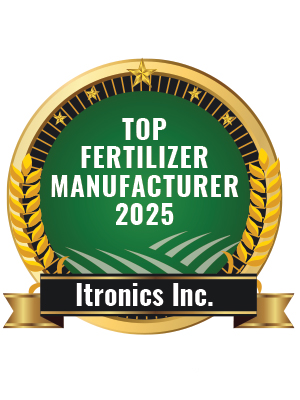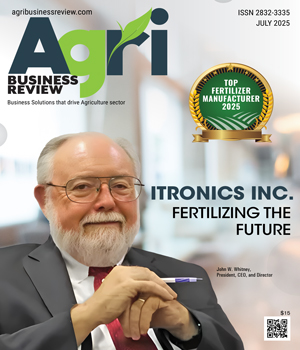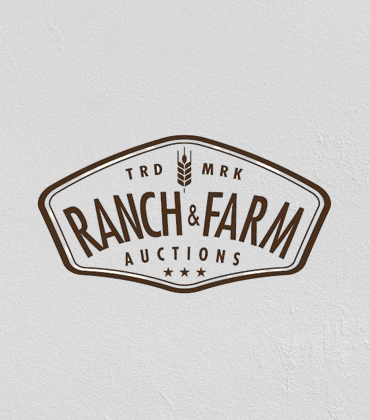Thank you for Subscribing to Agri Business Review Weekly Brief
Agri Business Review: Specials Magazine
On the outskirts of Reno, Nevada, far from the high-tech labs of Silicon Valley and the chemical giants of the Midwest, a small team of innovators has been quietly rewriting the rules of agricultural science. Itronics Inc., born from its early operations in the photographic waste space and shaped by decades of research and development, has developed a breakthrough in plant nutrition—a series of liquid fertilizers that don’t just feed plants, but change how they grow. At first glance, Itronics might look like a niche player in a crowded industry. But behind its modest profile is a well-established technology that’s already been used on more than 2 million acres of farmland, golf courses and nurseries. More than fertilizers, its products are a new class of chemistry, and one that has only recently begun to receive the scientific recognition it deserves. “Ours is the story of how a company started with photo-processing waste and ended up inventing a new category of agricultural inputs, years before the science world had a name for it,” says John W. Whitney, President, CEO, and Director. Dr. Whitney, with a pH D. in Mineral Economics from Penn State, and Bachelors and Masters degrees in Mineralogy and Geology from the University of Nebraska, over his career has become a skilled Minerals Technologist in mining, plant nutrition and waste-recycling with a focus on zero waste and energy saving. Born from the Darkroom The origins of Itronics trace back to a time when photographic film was still king. As photo labs processed film, they produced gallons of spent fixer solution— liquid waste laced with silver and other metals. For most companies, it was a hazardous waste headache. But for Dr. Whitney, it was something else; potential.
Ag Marketing Services of the Year 2025
Trader PhD Ag Marketing
Real-Time Insights for Smarter Farming Decisions
Chad Toyne, Founder and CEO
The agricultural commodity market holds immense opportunities, but success comes down to understanding its dynamics and knowing when to capitalize on them. With prices fluctuating, forecasts shifting, and information overload clouding decision-making, grain and livestock producers need more than data—they need clarity and strategy. Trader PhD, founded by seasoned trader Chad Toyne, bridges this gap by turning market complexity into actionable insights. Through timely and relevant updates and expert analysis, it empowers producers to make informed marketing decisions. It cuts through the noise to help producers navigate volatility, optimize pricing and protect their bottom line. “Timing is critical,” says Toyne, founder and CEO. “Not only do you need to act when the time is right, but you need to be properly positioned for that critical time window.” Marketing With Purpose Toyne founded Trader PhD on the belief that trading wasn’t just about understanding market trends—it required a disciplined, strategic approach to risk management. Toyne grew up on a farm, living through the grain price surges during the 1988 drought and the devastating flood of 1993. He saw how extreme events could disrupt markets and producers' livelihoods. That background laid the foundation for developing a strategy for better market outcomes, not leaving it to guesswork. Yet, many brokers advising farmers operated without a clear plan, offering hedging recommendations without defined strategies. The decisions were too reactive. This left producers uncertain about coverage levels, timing and necessary adjustments, often resulting in unnecessary costs or missed opportunities to protect their profits. Trader PhD was created to change that. Rather than leaving producers to navigate volatile markets alone or rely on advice driven by commissions, he believed in equipping them with the knowledge and strategies needed to take control of their marketing. “Knowing what to expect allows you to make confident decisions and follow through with the execution,” says Toyne. Real-Time Insights Delivered Directly to Producers Trader PhD’s audio broadcasts go beyond numbers. They offer clear, actionable insights. Delivered directly to producers via phone calls, these four-minute updates cover key commodities such as corn, soybeans, wheat, cattle and hogs. Each update provides a concise overview of price movements, supply and demand shifts and risk factors. Producers can stay on top of crucial information without being overwhelmed. It also offers tools designed to keep them ahead of the market. Daily market commentary via text provides quick, up-to-date analysis, while buy and sell signals aid timely, confident decisions..
Farm Land Auction Service 2025
Providing selling solutions for farming families across the US, Ranch & Farm Auctions leads the agricultural auction space. Whatever may be the stipulation, it finds the fitting workable solution. In an instance when a trust farmland had to be split between the three beneficiary groups, it found a solution that met their respective criteria. Ranch & Farm Auctions worked closely with them, alongside the local agent and the trustee to gather essential information and conduct thorough due diligence to develop a tailored sales strategy. Through transparent communication, they advised them on whether a traditional listing or an auction would best serve their respective needs. Ultimately, it facilitated a solution that allowed one beneficiary to retain a portion of the land while successfully auctioning off the remaining two-thirds. The auction exceeded expectations, leaving all parties satisfied with the outcome. Ranch & Farm Auctions, a Whitetail Properties Real Estate division, is setting the bar high in the agricultural auction industry by being an auction house through its extensive reach, advanced marketing strategies and customer-centric approach. Its operations span over 40 states with a network of over 350 agents referred to as Land Specialists, giving it an unmatched ability to connect sellers with qualified buyers across the U.S., distinguishing it from competitors. “Our approach also allows us to generate awareness and leads on a broader national scale while our local Land Specialists serve their areas and spread awareness at the highest level by reaching those in the communities they live and work in daily. It truly is a local, regional and national approach for every auction,” says Joe Gizdic, director at Ranch & Farm Auctions.
CXO INSIGHTS
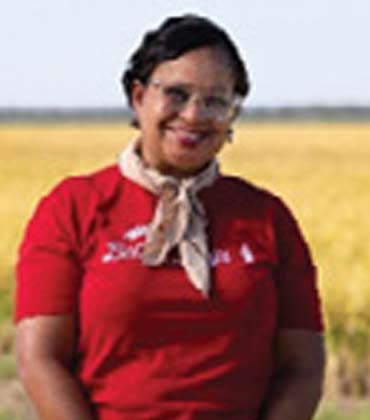
Advancing Sustainable Food Access And Esg Strategies
Kimberley Sundy, Senior Director, Sustainability, Kellogg Company[NYSE: K]
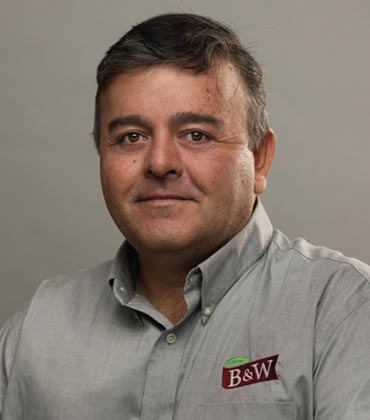
Technology - Agriculture's Most Powerful Tool
Cesar Rosero, Vice President of Production, B&W Quality Growers
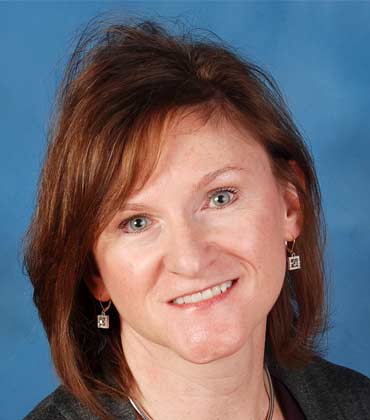
Improving Public Health Through Agriculture
Colleen M. Zammer, Vice President of Varietal Solutions Growth & Corporate Innovation, Bay State Milling Company

Agriculture Sustainability
Dave Hyde, Agriculture Sustainability Manager, JR Simplot Global Food Group

The Path to Sustainable Agriculture Through Collaboration and Innovation
Anna Pierce, Director of Sustainability, Tate & Lyle

An Agronomic Outlook for US Farming
Paul Bonnett, Senior Director, Nutrien Agronomy, Nutrien Ag Solutions
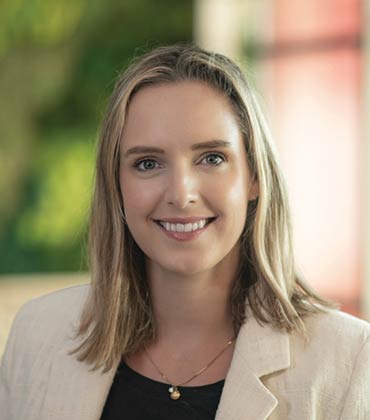
A Strategic Approach to Product Marketing
Jessica Blondeel, Director of Communications and Digital Marketing, Puratos
IN FOCUS
The Fertilizer Industry's Role in Global Ag Policy
The global fertilizer industry is vital for food security, driven by rising demand, efficiency innovations, and sustainable practices for optimal crop growth.
Reinventing Agricultural Marketing for a Changing World
Agricultural marketing services enhance food supply chains by linking producers to consumers, leveraging technology to promote efficiency, transparency, and sustainability in the market.
EDITORIAL
Embracing Sustainability and Innovation
One of the most noticeable shifts in the fertilizer manufacturing space is the industry's increasing focus on sustainability. Traditional synthetic fertilizers, while effective in boosting crop yields, come with environmental costs, including soil degradation, water pollution, and greenhouse gas emissions. In response, manufacturers are turning to more sustainable solutions such as slow-release fertilizers, bio-based products, and organic alternatives. These innovations are designed to minimize environmental impact while ensuring efficient nutrient delivery to crops.
In addition, companies are investing in technologies to reduce carbon emissions in their production processes. For example, renewable energy sources and carbon capture technologies are being adopted to make fertilizer production less carbon-intensive.
Technology is playing a pivotal role in reshaping how fertilizers are manufactured and applied. Precision agriculture, which involves using data analytics, GPS, and sensor technology, is making it possible for farmers to apply fertilizers more accurately. This reduces waste, improves crop yield, and minimizes environmental harm. Fertilizer manufacturers are increasingly working on developing products that are compatible with these technologies, enabling farmers to optimize their usage and enhance farm efficiency.
With emerging markets in Asia, Africa, and Latin America experiencing rapid agricultural growth, fertilizer manufacturers are focusing on expanding their footprint in these regions. However, the global supply chain for fertilizers remains fragile, as evidenced by recent disruptions due to geopolitical tensions and climate events. Manufacturers are adapting by diversifying their supply chains and exploring local production facilities to ensure a stable supply.
As the demand for food continues to rise, fertilizer manufacturers must balance productivity with sustainability. Innovations in production processes, combined with emerging technologies, are paving the way for a greener, more efficient future in the fertilizer industry.
In this edition, we present insights from expert CXOs like Janie Page, CMO of The Human Bean and Paloma Lopez, Chief Sustainability & Communications Officer, Bel US, who offer their opinions on the currently used business practices. We hope that the valuable insights from industry leaders and the solutions and services featured in this edition will assist you in making informed decisions for your business.

